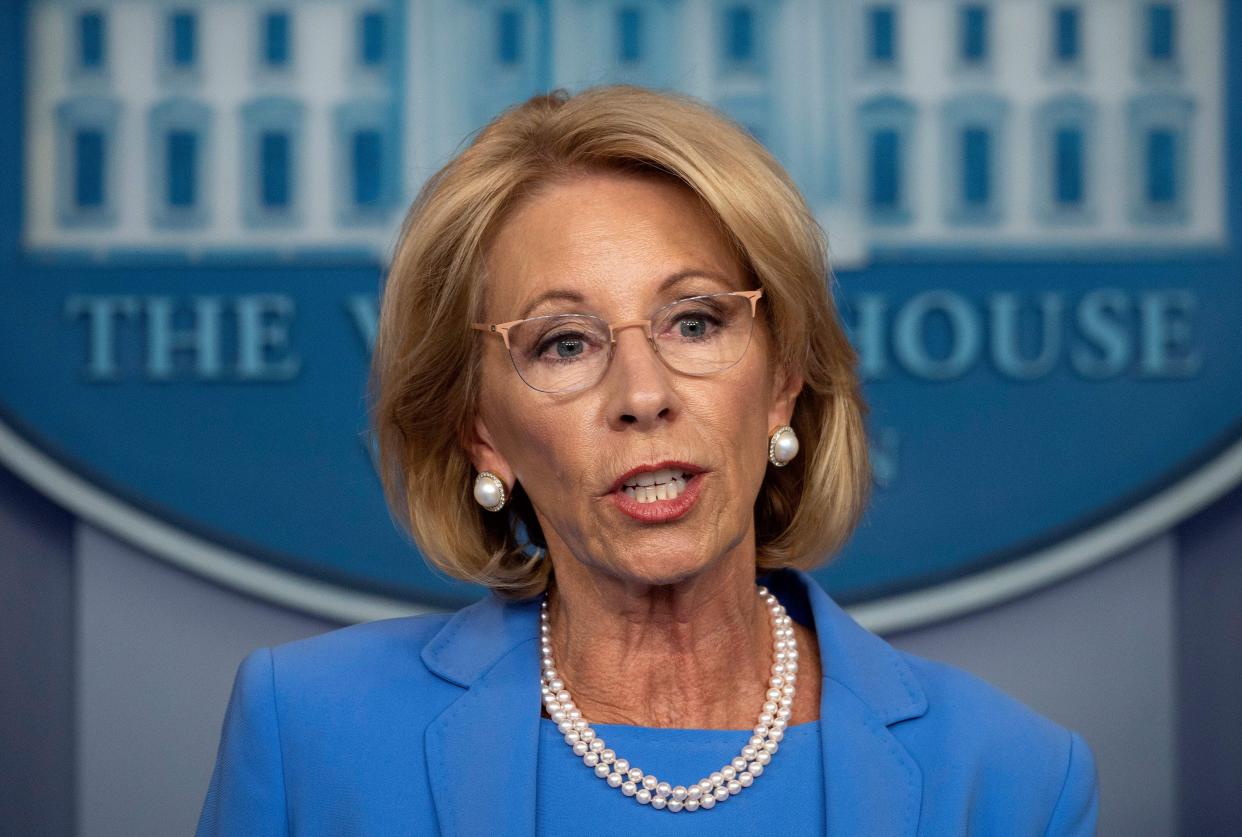Secretary DeVos Recommends Maintaining Core Parts Of Disability Law Amid Pandemic

U.S. Secretary of Education Betsy DeVos recommended Monday that Congress waive narrow provisions in the Individuals with Disabilities Education Act, while recommending that essential principles of the sprawling law remain intact, in a move at least one disability rights group is cheering.
“I am shocked and amazed and really, really pleased … about the report from Secretary DeVos not undermining the wonderful protections with students with disabilities,” said Miriam Rollin, director of the Education Civil Rights Alliance at the National Center for Youth Law.
DeVos made her recommendations in a report to congressional committees. The report comes after Congress’ late March coronavirus relief package granted DeVos 30 days to make recommendations on whether sections of IDEA should be waived amid widespread school closures. Now, it is up to Congress to decide whether to vote her recommendations into policy.
IDEA is a sprawling education law that includes hundreds of mandates for schools and educators. The law scrupulously details everything from how schools should interact with parents of students with disabilities to how to pay for students’ services. However, as school districts shift to virtual learning during the coronavirus pandemic, teachers and school administration groups have complained that many of these mandates are no longer tenable.
DeVos, however, is only recommending limited waivers on three sections of the law, including one that grants timeline flexibility to schools evaluating toddlers for potential services. She did not recommend any waivers for section 504 of the Rehabilitation Act of 1973 ― which bans discrimination based on disability — and says she is rejecting waivers that impede on the core tenants of IDEA, which is designed to provide students with disabilities with an education that is analogous to their peers.
“While the Department has provided extensive flexibility to help schools transition, there is no reason for Congress to waive any provision designed to keep students learning,” DeVos said in a statement. “With ingenuity, innovation, and grit, I know this nation’s educators and schools can continue to faithfully educate every one of its students.”
Disability rights groups and parents urged the Department of Education to keep the law fully intact, saying waivers are unnecessary and could lead to an eventual chipping away of the signature education law. Groups like the School Superintendents Association and National Association of State Directors of Special Education, though, have lobbied for temporary flexibility from some of these directives.
School districts have also said they’re especially concerned with getting sued, especially as they’re likely about to face huge budget cuts amid big state revenue shortfalls. Schools could be held accountable, they say, for failing to live up to a student’s individualized education program ― the legal document that outlines necessary services for a disabled student ― even as barriers to successful implementation mount ever higher.
“Federal laws were not written anticipating a global pandemic that has closed a large majority of schools across the country,” said a March letter from the National Association of State Directors of Special Education and the Council of Administrators of Special Education to the Department of Education.
The School Superintendents Association told HuffPost it was not commenting on the matter. The National Association of State Directors of Special Education did not immediately respond to request for comment.
The ball is now in Congress’ court.
“This is not over,” said Rollin. “But we are very, very relieved.”
Related...
How Children With Disabilities Are Getting Left Behind
To Access Online Services, New Jersey Students With Disabilities Must Promise Not To Sue
A HuffPost Guide To Coronavirus
Stay up to date with our live blog as we cover the COVID-19 pandemic
What happens if we end social distancing too soon?
What you need to know about face masks right now
How long are asymptomatic carriers contagious?
Lost your job due to coronavirus? Here’s what you need to know.
Everything you need to know about coronavirus and grief
Parenting during the coronavirus crisis?
What coronavirus questions are on your mind right now? We want to help you find answers.
Everyone deserves accurate information about COVID-19. Support journalism without a paywall — and keep it free for everyone — by becoming a HuffPost member today.
Love HuffPost? Become a founding member of HuffPost Plus today.
This article originally appeared on HuffPost.

